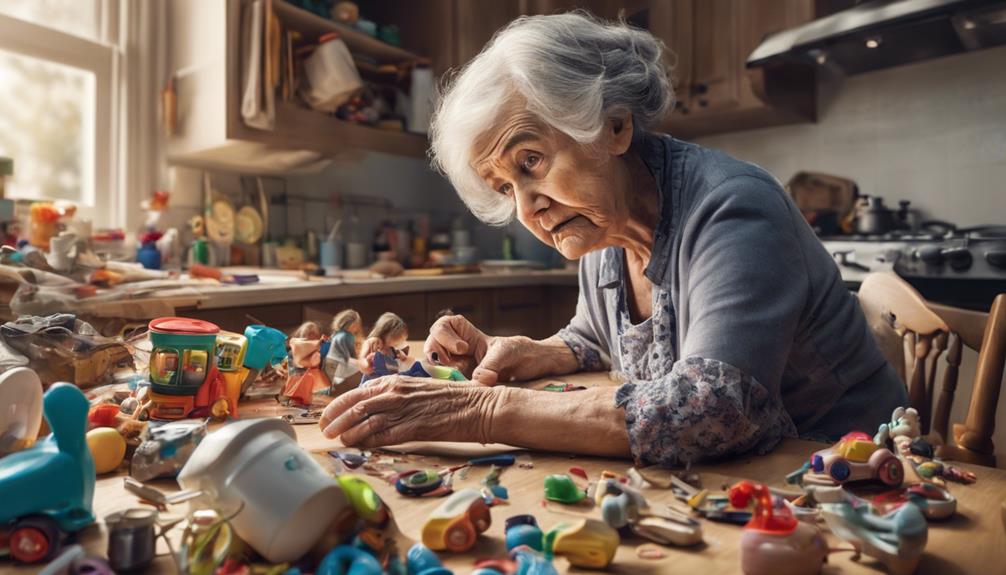It may come as a surprise to find out that **dementia** palliative care goes beyond medical care. This method considers the overall welfare of individuals dealing with this difficult condition, attending to their physical, emotional, and mental needs. Those who seek out this kind of care experience the greatest benefits. Curious as to why?
From symptom management to end-of-life decision-making considerations, palliative care offers a holistic support system that aims to enhance the overall quality of life for both patients and their families.
So, what exactly does this specialized care entail, and how does it impact the journey of those affected by dementia?
Key Takeaways
- Enhances quality of life holistically
- Manages symptoms effectively
- Provides emotional support for patients and families
- Guides end-of-life decision-making
Importance of Palliative Care in Dementia
When facing the challenges of dementia, recognizing the importance of palliative care can offer invaluable support and comfort to both individuals with the condition and their loved ones.
Palliative care in dementia focuses on enhancing quality of life through a holistic approach that addresses physical, emotional, and spiritual needs. This type of care involves a multidisciplinary team of healthcare professionals, including doctors, nurses, and social workers, who work together to provide comprehensive support.
Advance care planning discussions are crucial components of palliative care in dementia, ensuring that the individual's wishes and preferences are respected throughout their illness.
Symptom Management Strategies

Effective management of symptoms in dementia is crucial for improving the quality of life for individuals experiencing the condition. When it comes to symptom management strategies, here are key points to consider:
- Utilize tools like the Pain Assessment in Advanced Dementia scale for accurate pain assessment and management.
- Pay attention to indicators like agitation and dyspnea in advanced dementia stages, as they may signal underlying pain that requires specialized recognition and treatment.
- Address different types of pain such as neuropathic, nociceptive, or mixed pain as dementia progresses, tailoring management approaches to the specific needs of the individual.
Managing symptoms in dementia becomes increasingly complex as the disease advances, making it essential to employ specialized techniques for symptom recognition and treatment. By staying vigilant and proactive in symptom management, caregivers and healthcare providers can help enhance the comfort and well-being of individuals living with dementia.
Emotional Support for Patients and Families
In palliative care for dementia, providing emotional support is a crucial aspect that addresses the psychological and social needs of both patients and their families. This support plays a vital role in reducing anxiety, depression, and feelings of isolation commonly experienced by individuals with dementia and their caregivers. Counseling, therapy, and support groups are integral components of emotional support in palliative care for dementia, offering avenues for individuals to express their emotions and receive guidance. Creating a safe space for open communication is essential in enhancing the overall well-being of patients and families. Empathy, compassion, and understanding are key in fostering a supportive environment for those navigating the challenges of dementia care.
| Emotional Support in Dementia Care | Examples |
|---|---|
| *Psychological Needs* | Counseling, Therapy |
| *Social Needs* | Support Groups |
| *Communication* | Open, Honest Discussions |
End-of-Life Decision-Making Considerations

To make informed decisions regarding end-of-life care for individuals with dementia, it's essential to engage in advance care planning early in the disease progression. This proactive approach allows for the documentation of end-of-life preferences and the appointment of a surrogate decision-maker to ensure that the individual's wishes are known and respected. Advance directives play a crucial role in guiding end-of-life care decisions for those with advanced dementia.
Key Considerations:
- Discuss End-of-Life Preferences Early: Initiating conversations about end-of-life decisions in the early stages of dementia progression is vital for honoring the patient's wishes.
- Selecting a Surrogate Decision-Maker: Appointing a trusted individual to make healthcare choices on behalf of the person with dementia when they're no longer able to do so is crucial.
- Exploring Care Settings: Understanding the various care settings available, such as home care, care homes, hospice care, hospital care, and NHS continuing healthcare, can help in making appropriate end-of-life care decisions.
Collaborative Care Approach for Dementia
Employing a collaborative care approach for dementia involves a diverse team of healthcare professionals working together to address complex symptoms and underlying causes in patients with the condition. This multidisciplinary team, consisting of doctors, nurses, social workers, and specialists, focuses on holistic symptom management rather than mere symptom suppression.
By conducting comprehensive evaluations, adjustments to treatment plans for dementia patients are guided, ensuring a coordinated strategy to enhance the overall well-being of individuals. The collaborative care approach aims to improve the quality of life for those with dementia by addressing not only the symptoms but also the root causes of the condition.
This method recognizes the importance of a combined effort in providing comprehensive care tailored to the unique needs of each patient, fostering a supportive and effective environment for both patients and their caregivers. Through this approach, the team endeavors to create a positive impact on the lives of those affected by dementia, promoting dignity and comfort throughout the care process.
Frequently Asked Questions
What Does Palliative Care Do for Dementia Patients?
Palliative care for dementia patients aims to enhance quality of life by managing symptoms and offering emotional support. It helps address challenges such as feeding difficulties, infections, and decision-making issues in advanced stages of dementia.
Tailored care plans include maintaining routines and memory therapy. Teams facilitate discussions about goals, concerns, and treatment options for both patients and families. Support is also offered to caregivers in planning care arrangements and making decisions.
What Are the Signs That a Dementia Patient Is Near Death?
As a dementia patient nears the end of life, you may notice signs like:
- Difficulty swallowing and reduced food intake
- Increased sleeping and changes in breathing patterns
- Decreased responsiveness and increased confusion
Behavioral changes such as:
- Restlessness, agitation, or withdrawal might indicate the progression towards the end.
Physical signs could include:
- Skin changes, reduced mobility, and incontinence becoming more pronounced.
Additional indicators might include:
- Communication difficulties, reduced social interaction, and a decrease in overall function.
How Long Can Someone With Dementia Be in Palliative Care?
In palliative care for dementia, the duration varies based on individual needs and disease progression. Some may receive care for several years, starting early and continuing as the disease advances.
The focus is on enhancing comfort, managing symptoms, and providing support for both the patient and their family. The goal is to improve quality of life and address the challenges faced.
What Are the Final Stages of Mixed Dementia?
In the final stages of mixed dementia, you may witness a profound decline in cognitive functions, memory loss, and day-to-day abilities. Behavioral and psychological symptoms can intensify, making communication and care challenging.
Physical symptoms like swallowing difficulties, incontinence, and immobility may become more prevalent. Providing specialized care focused on symptom management and quality of life support becomes crucial for those in end-stage mixed dementia.
Conclusion
In the realm of dementia care, palliative practices provide personalized support, soothing symptoms, and solace for families. By emphasizing empathy and collaboration, palliative care ensures comfort and compassion throughout the journey.
Embracing this holistic approach can alleviate anguish, enhance quality of life, and empower individuals facing dementia challenges. Let's embrace the power of palliative care to navigate the uncertainties with understanding and unity.









